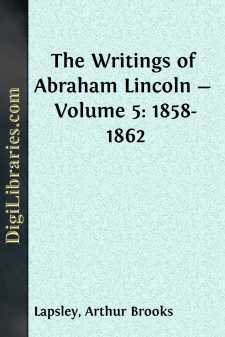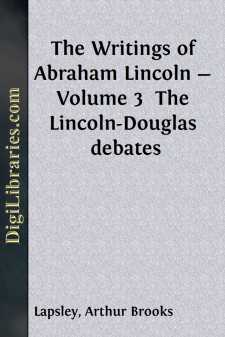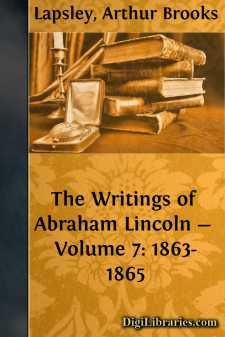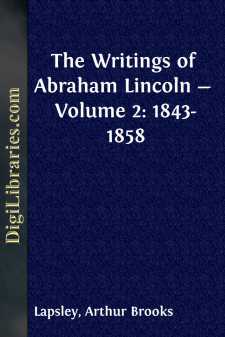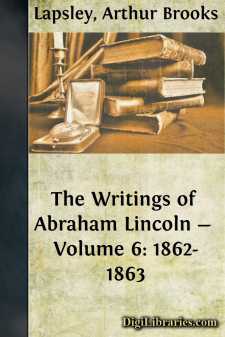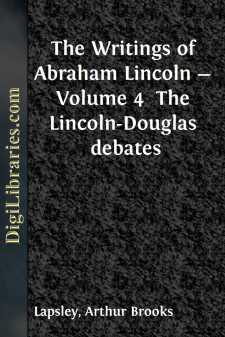Categories
- Antiques & Collectibles 13
- Architecture 36
- Art 48
- Bibles 22
- Biography & Autobiography 813
- Body, Mind & Spirit 142
- Business & Economics 28
- Children's Books 17
- Children's Fiction 14
- Computers 4
- Cooking 94
- Crafts & Hobbies 4
- Drama 346
- Education 46
- Family & Relationships 57
- Fiction 11829
- Games 19
- Gardening 17
- Health & Fitness 34
- History 1377
- House & Home 1
- Humor 147
- Juvenile Fiction 1873
- Juvenile Nonfiction 202
- Language Arts & Disciplines 88
- Law 16
- Literary Collections 686
- Literary Criticism 179
- Mathematics 13
- Medical 41
- Music 40
- Nature 179
- Non-Classifiable 1768
- Performing Arts 7
- Periodicals 1453
- Philosophy 64
- Photography 2
- Poetry 896
- Political Science 203
- Psychology 42
- Reference 154
- Religion 513
- Science 126
- Self-Help 84
- Social Science 81
- Sports & Recreation 34
- Study Aids 3
- Technology & Engineering 59
- Transportation 23
- Travel 463
- True Crime 29
The Writings of Abraham Lincoln - Volume 5: 1858-1862
Categories:
Description:
Excerpt
SPEECH AT CLINTON, ILLINOIS,
SEPTEMBER 8, 1858.
The questions are sometimes asked "What is all this fuss that is being made about negroes? What does it amount to? And where will it end?" These questions imply that those who ask them consider the slavery question a very insignificant matter they think that it amounts to little or nothing and that those who agitate it are extremely foolish. Now it must be admitted that if the great question which has caused so much trouble is insignificant, we are very foolish to have anything to do with it—if it is of no importance we had better throw it aside and busy ourselves with something else. But let us inquire a little into this insignificant matter, as it is called by some, and see if it is not important enough to demand the close attention of every well-wisher of the Union. In one of Douglas's recent speeches, I find a reference to one which was made by me in Springfield some time ago. The judge makes one quotation from that speech that requires some little notice from me at this time. I regret that I have not my Springfield speech before me, but the judge has quoted one particular part of it so often that I think I can recollect it. It runs I think as follows:
"We are now far into the fifth year since a policy was initiated with the avowed object and confident promise of putting an end to slavery agitation. Under the operation of that policy that agitation has not only not ceased but has constantly augmented. In my opinion it will not cease until a crisis shall have been reached and passed.
"A house divided against itself cannot stand. I believe this government cannot endure permanently half slave and half free. I do not expect the Union to be dissolved. I do not expect the house to fall, but I do expect it will cease to be divided. It will become all one thing or all the other. Either the opponents of slavery will arrest the further spread of it and place it where the public mind shall rest in the belief that it is in the course of ultimate extinction; or its advocates will push it forward till it shall become alike lawful in all the States, old as well as new, North as well as South."
Judge Douglas makes use of the above quotation, and finds a great deal of fault with it. He deals unfairly with me, and tries to make the people of this State believe that I advocated dangerous doctrines in my Springfield speech. Let us see if that portion of my Springfield speech of which Judge Douglas complains so bitterly, is as objectionable to others as it is to him. We are, certainly, far into the fifth year since a policy was initiated with the avowed object and confident promise of putting an end to slavery agitation. On the fourth day of January, 1854, Judge Douglas introduced the Kansas-Nebraska bill. He initiated a new policy, and that policy, so he says, was to put an end to the agitation of the slavery question. Whether that was his object or not I will not stop to discuss, but at all events some kind of a policy was initiated; and what has been the result?...


